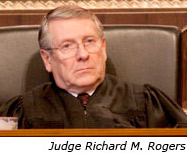5/31/2012
Ohio Court Blasts Police Embellishment of Traffic Stop TestimonyOhio Court of Appeals rules police must understand the traffic law they use to stop a motorist.

Prosecutors and sometimes even judges will embellish the testimony of a police officer to justify a traffic stop after the fact. A divided Ohio Court of Appeals panel ruled Tuesday that this practice was unacceptable. The majority determined Henry County Deputy Sheriff Sean Wymer unconstitutionally seized Dustin A. Haas because the officer did not understand the law he was enforcing.
At around 2:30am on March 16, 2010 Wymer saw Haas' vehicle stopped on State Route 65 in the village of McClure. A woman was standing outside the car. As Wymer passed, Haas' car pulled off onto a side street and parked in a driveway. Wymer approached, turned on his lights and conducted a traffic stop based on what he said was a violation of Ohio law prohibiting "stopping in the roadway." Alicia Reinbolt says Haas was picking her up that night and took her to a friend's house. In a 2-1 decision, an appellate panel overturned a lower court decision that found Wymer's actions legal.
"In order for a traffic stop to be constitutional, an officer must be able to articulate that the defendant's conduct violated a traffic law on its face," Judge Richard M. Rogers wrote for the majority.
The law that Wymer cited prohibits stopping on any highway "outside a business or residence district." Since Haas was in a business district, the code did not apply. The trial judge and dissenting appellate Judge Stephen R. Shaw argued the totality of the circumstances, which included the turn off the road and parking on the driveway, were suspicious. The majority disagreed because this was not Wymer's rationale.
"The officer testified that he had already made his decision to stop the vehicle based on his mistaken notion that a violation of law had occurred, and that was his sole reason for the stop," Rogers wrote. "No other facts or circumstances are material to our consideration of the officer's reasonable articulable suspicion. If the officer had found other acts of appellant to be suspicious he could have so testified. He did not."
Prosecutors insisted that police cannot be expected to have expert knowledge of every traffic law they enforce. Requiring such knowledge, they said, would create "paralysis by analysis." The majority said such knowledge is the bare minimum standard officers must meet.
"We aver that knowledge of the traffic laws is the very essence of a patrol officer's job," Rogers wrote. "To require any less than an accurate, working knowledge of the traffic offenses and to fail to ensure that the one being seized at least reasonably appeared to have violated a statute on its face gravely deprives citizens of their constitutional right to be free from warrantless searches and seizures."
The judges reversed Haas' conviction for driving under the influence of alcohol. A copy of the decision is available in a 225k PDF file at the source link below.


